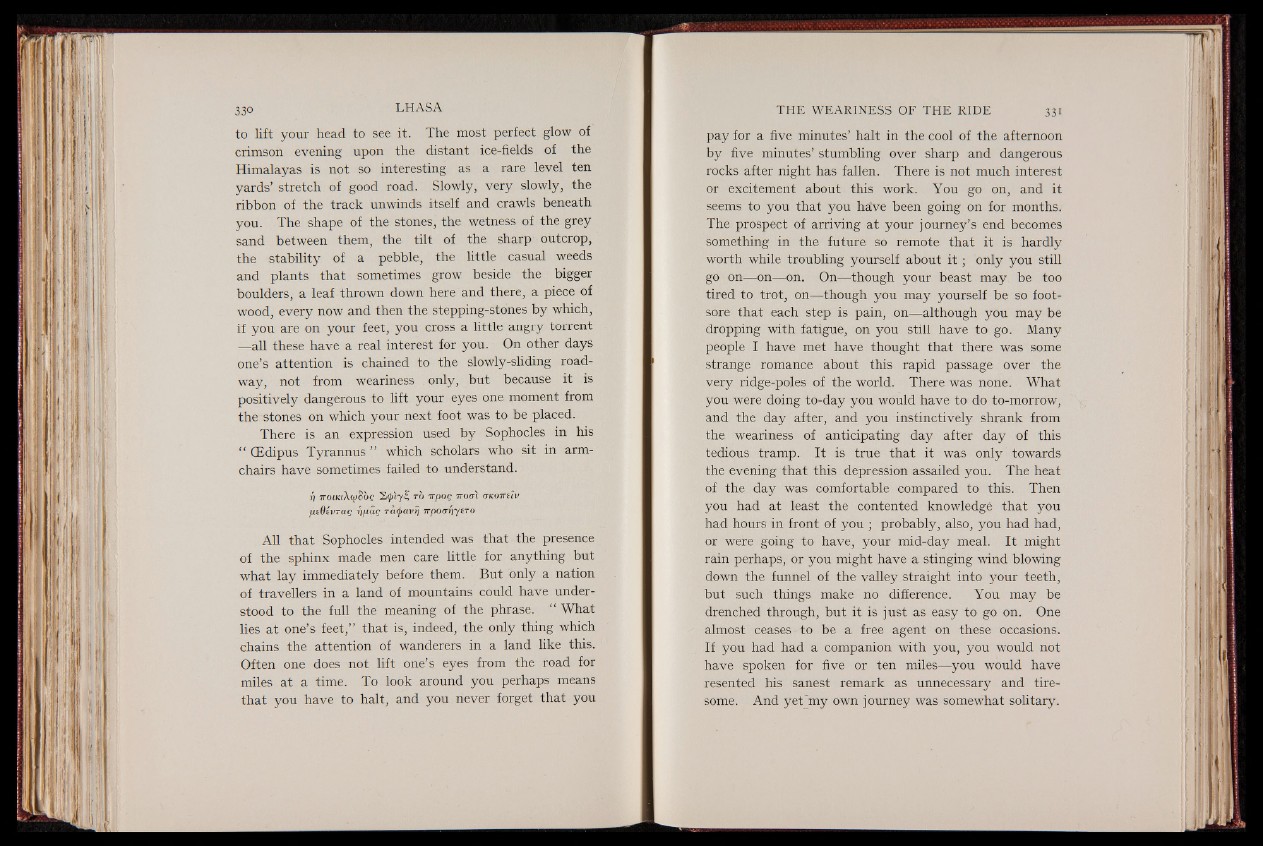
to lift your head to see it. The most perfect glow of
crimson evening upon the distant ice-fields of the
Himalayas is not so interesting as a rare level ten
yards’ stretch of good road. Slowly, very slowly, the
ribbon of the track unwinds itself and crawls beneath
you. The shape of the stones, the wetness of the grey
sand between them, the tilt of the sharp outcrop,
the stability of a pebble, the little casual weeds
and plants that sometimes grow beside the bigger
boulders, a leaf thrown down here and there, a piece of
wood, every now and then the stepping-stones by which,
if you are on your feet, you cross a little angry torrent
— all these have a real interest for you. On other days
one’s attention is chained to the slowly-sliding roadway,
not from weariness only, but because it is
positively dangerous to lift your eyes one moment from
the stones on which your next foot was to be placed.
There is an expression used by Sophocles in his
“ OEdipus Tyrannus ” which scholars who sit in armchairs
have sometimes failed to understand.
17 7ro(KiX<ji§oe S (¡>ly^ to TTpog irom okottuv
ptOivrag vpag ratpavtj irpoariytTO
All that Sophocles intended was that the presence
of the sphinx made men care little for anything but
what lay immediately before them. But only a nation
of travellers in a land of mountains could have understood
to the full the meaning of the phrase. “ What
lies at one’s feet,” that is, indeed, the only thing which
chains the attention of wanderers in a land like this.
Often one does not hit one’s eyes from the road for
miles at a time. To look around you perhaps means
that you have to halt, and you never forget that you
pay for a five minutes’ halt in the cool of the afternoon
by five minutes’ stumbling over sharp and dangerous
rocks after night has fallen. There is not much interest
or excitement about this work. You go on, and it
seems to you that you have been going on for months.
The prospect of arriving at your journey’s end becomes
something in the future so remote that it is hardly
worth while troubling yourself about i t ; only you still
go on— on— on. On— though your beast may be too
tired to trot, on— though you may yourself be so footsore
that each step is pain, on— although you may be
dropping with fatigue, on you still have to go. Many
people I have met have thought that there was some
strange romance about this rapid passage over the
very ridge-poles of the world. There was none. What
you were doing to-day you would have to do to-morrow,
and the day after, and you instinctively shrank from
the weariness of anticipating day after day of this
tedious tramp. It is true that it was only towards
the evening that this depression assailed you. The heat
of the day was comfortable compared to this. Then
you had at least the contented knowledge that you
had hours in front of you ; probably, also, you had had,
or were going to have, your mid-day meal. It might
rain perhaps, or you might have a stinging wind blowing
down the funnel of the valley straight into your teeth,
but such things make no difference. You may be
drenched through, but it is just as easy to go on. One
almost ceases to be a free agent on these occasions.
If you had had a companion with you, you would not
have spoken for five or ten miles you would have
resented his sanest remark as unnecessary and tiresome.
And yet'my own journey was somewhat solitary.